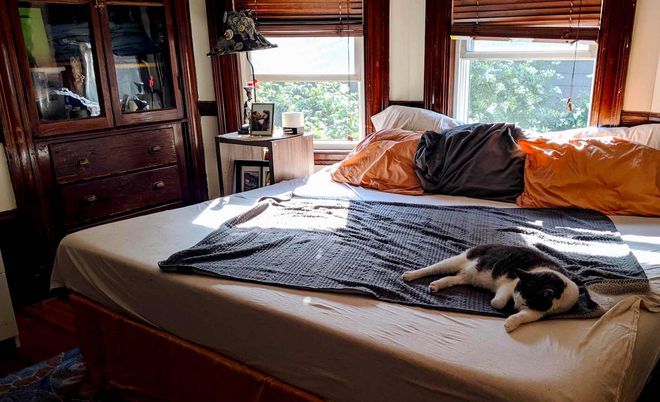For a decade, I’ve been working from home as part of a virtual team and as a freelancer. So purely in terms of work environment, for me, working virtually in self-isolation during this COVID-19 pandemic hasn’t required much of an adjustment.
The emotional burden of the mass suffering, however, can be overwhelming. I’ve found myself in reactive mode, overstimulated by the horrific news every day, and feeling helpless. To maintain any kind of productivity, I’ve turned back to some freelancing best practices that provide a bit of structure or framework for getting things done.
No, I don’t have any Golden Tablets of Truth to share here. These are just some best practices that I find helpful.
1. Dress for work.

Believe me, getting dressed for work in the morning can help prevent or alleviate the I’m-feeling-overwhelmed blues. When you’re dressed for the day, there’s a psychological boost that happens. It can help you get your face-the-world spirit going.
• Make it a routine.
This might take more effort than before, because dressing for a job you go to is in many ways reactive—you have no choice, so in many ways you’re on autopilot. Now you have to make a conscious choice to get dressed.
• Start slow.
Try it for a week. Or only three days a week. But try to be consistent in the small way you define, so that the discipline gradually becomes a practice, which eventually becomes a routine, which eventually becomes a habit.
2. Set office hours and keep them.

When you work from home, it can be tempting and easy to start work as soon as your eyes open, and stay at it though meals, into what’s supposed to be relaxation time and/or family time. Don’t fall into that trap.
• When office hours are over, close the virtual office door.
Get your family/housemates on board with this. Years ago, I was running a business with an intimate partner, and we quickly realized we were driving each other into the ground by never closing that virtual office door (and we even had physical office door). Our compromise was No business in the bedroom. That was a last resort. In hindsight, it wasn’t near enough.
• Use apps and reminders to help, if needed.
I have a calendar dedicated just to office hours. I’ve worked to establish a daily routine of relaxing (read: working on my fiction writing) until it’s time to get dressed for work, then getting dressed, then as office hours begin, planning my day, and getting on with the work.
• Honor quitting time.
Yes, sometimes you have to sprint and put in the extra hours for that pressing deadline, but don’t make that the baseline. That extra productivity energy you put in today means a bit less productivity energy tomorrow. Do it enough, and you lose focus as well as energy and start making mistakes you normally wouldn’t make. Pace yourself.
• If you’re not on call, don’t keep checking your emails—and certainly don’t answer them.
This can be the fast track to burnout.
3. Know your biorhythms.

If your natural rhythms trend toward getting up later or earlier, and your commitments allow for flexibility, go with your natural rhythms.
4. Take breaks.

Use a pomodoro-type timer if you have to. Get up, walk around a bit, shake your hands and wrists (helps if you work at a computer), let your eyes relax and focus on other things at other distances, clear your head. Find what works for you. Maybe it’s five minutes every hour, or every twenty-five minutes.
5. Don’t forget to eat.

Yeah, that’s a thing. It can be easy to forget. If you have to, set a lunch alarm.
6. Naps are your friend.

I won’t cite the countless studies showing how napping can help productivity. Just be careful that you nape the right duration. Too long, and you might fall into a deep sleep—and then you’re in for an hour and a half before you can reasonably wake up. (This is a greater risk when you’re pushing too hard for long hours.) I often find that just ten minutes with my eyes closed—a “cortex reset,” I call it—can give me a refreshed boost of energy.
What am I missing?
What’s been working for you?